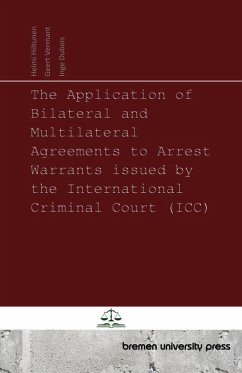The enforcement of warrants issued by the International Criminal Court (ICC) is a complex challenge because the court has no executive powers of its own and is entirely dependent on the cooperation of states. The case of Vladimir Putin is a prime example of this. This dependency often leads to an unsatisfactory situation in which ICC arrest warrants are merely symbolic because they are not implemented in practice or only selectively. States often weigh political, economic and diplomatic interests against their legal obligations, with the result that powerful or well-connected suspects remain protected from prosecution. In this context, low-threshold bilateral and multilateral agreements offer a potential solution to improve the enforcement of ICC arrest warrants. Bilateral agreements allow states to enter into targeted agreements with the ICC or with each other that allow them to execute warrants in certain cases without fully committing to the comprehensive provisions of the Rome Statute. These agreements could include specific reservations and conditions, such as limiting cooperation to certain categories of crimes such as genocide, crimes against humanity or war crimes. This targeted restriction would allow states to maintain their national sovereignty while contributing to international criminal prosecution. Multilateral agreements offer another way to create a broader basis for the enforcement of ICC arrest warrants. Such agreements could be negotiated at the regional level, for example, and promote cooperation between the ICC and organisations such as the African Union (AU) or the European Union (EU). In addition to bilateral and multilateral cooperation, closer integration of Interpol as a low-threshold partner of the ICC could facilitate the enforcement of international arrest warrants. Interpol could be given special powers to intensify its support for the implementation of ICC decisions. Such pragmatic approaches offer states a flexible way of cooperating that respects their political interests and takes their sovereignty into account. The possibility of making individual agreements tailored to specific conditions lowers the threshold for cooperation, which could encourage more states to support the ICC in individual cases.
Hinweis: Dieser Artikel kann nur an eine deutsche Lieferadresse ausgeliefert werden.
Hinweis: Dieser Artikel kann nur an eine deutsche Lieferadresse ausgeliefert werden.






![The Hague Court Reports [1St]- Series: Comprising the Awards, Accompanied by Syllabi, the Agreements for Arbitration, and Other Documents in Each Case The Hague Court Reports [1St]- Series: Comprising the Awards, Accompanied by Syllabi, the Agreements for Arbitration, and Other Documents in Each Case](https://bilder.buecher.de/produkte/66/66752/66752009m.jpg)

